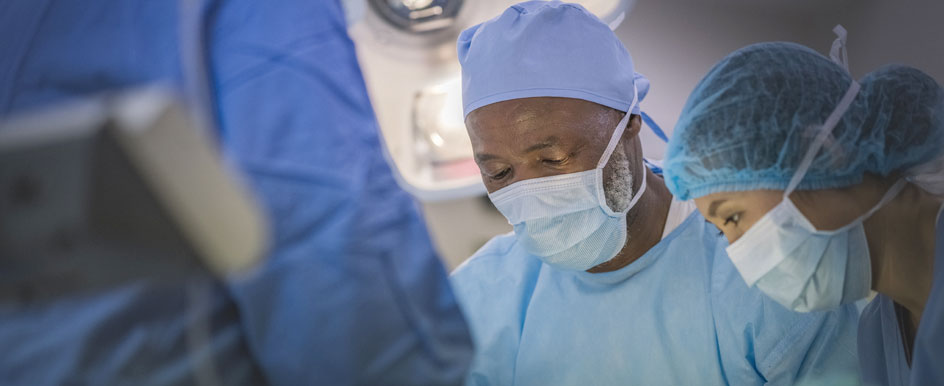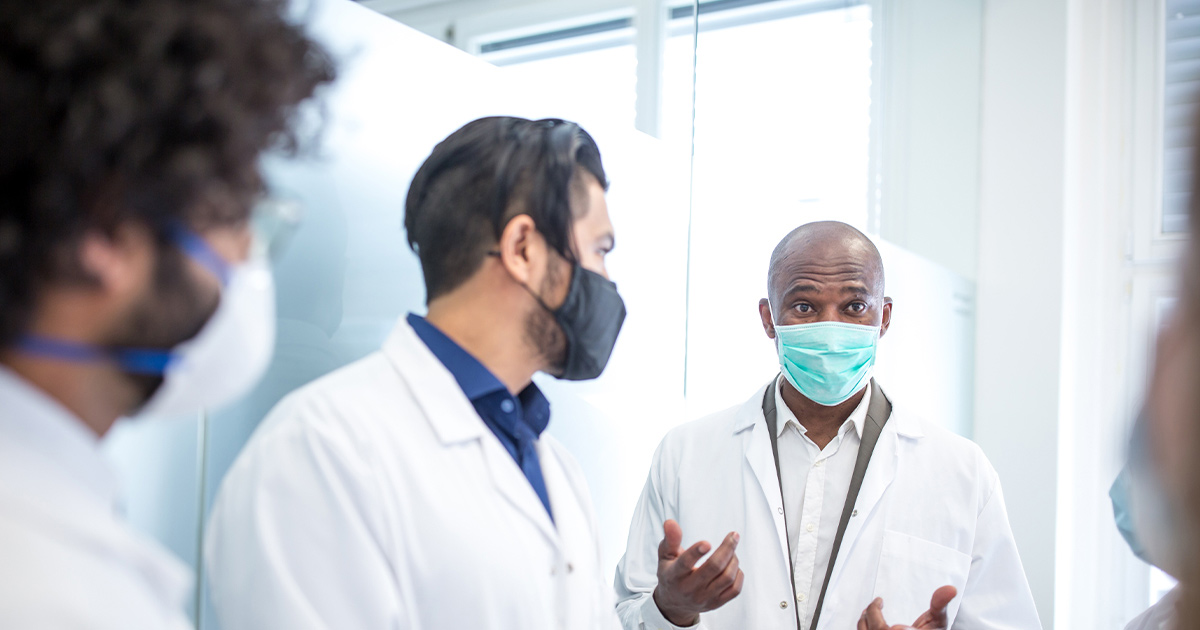General Surgery
Part of Tri-Valley

Leaders in General Surgery
At Stanford Health Care Tri-Valley, we understand that whether you’re having major or minor general surgery, you want a skilled specialist on your team. Our surgeons perform open and minimally invasive procedures for common and rare conditions. We are committed to delivering excellent results that improve your health and life.
What We Offer You for General Surgery Care
- Specialized expertise in treating a wide range of common and complex conditions, including breast cancer, diverticulitis, GERD, hernia, and neuroendocrine tumors. Go to Conditions Treated
- Advanced treatment options that prioritize minimally invasive surgery whenever possible for a faster, smoother recovery, with a comprehensive treatment plan to improve your quality of life. Go to Treatments
- Team-based approach with coordinated care between surgeons and specialists in pain management and rehabilitation for the highest level of treatment tailored to your condition and needs. Go to Your Care Team
- Ease of access, with leading-edge surgical options and comprehensive, convenient services and follow-up right in your community. Go to Accessing Care
Highly skilled surgeons at Stanford Health Care Tri-Valley perform both open and minimally invasive surgery for a broad range of common and complex conditions. We also work closely with other specialists, including urologists, cancer doctors, and reconstructive plastic surgeons, for precise procedures. Conditions we treat include:
Our general surgeons perform the newest minimally invasive procedures using laparoscopic and robotic technology.
Adrenal gland disorders
Our surgeons remove one or both adrenal glands for these complex disorders:
- Aldosteronism: Hormonal disorder that overproduces the hormone aldosterone, which causes high blood pressure
- Adrenal cancer: Rare type of cancer that forms in one or both adrenal glands
- Adrenal incidentalomas: Adrenal tumor found on an imaging test when screening for a different issue
- Cushing syndrome: Hormonal disorder that occurs when the body produces too much cortisol for an extended period
- Pheochromocytoma: Rare tumor that develops in one of the adrenal glands
Benign conditions of the colon, rectum, and anus
Our surgeons perform minimally invasive procedures, often saving the anal sphincter muscle to preserve bowel function. We treat:
- Anal fissure: Small tear in the lining of the anus
- Anal fistula: Abnormal, infected tunnel that forms between the skin and anus or the anus and other organs
- Diverticulitis: Small pouches (called diverticula) in the colon that become infected and inflamed
- Hemorrhoids: Swollen blood vessels inside or around the anus and lower rectum
Breast cancer
We have extensive experience in using surgery to treat all types of breast cancer, including:
- Invasive ductal carcinoma: Most common type of breast cancer that begins in the ducts and spreads to breast tissues
- Invasive lobular carcinoma: Breast cancer that begins in the milk-producing glands (called lobes and lobules) and spreads to other parts of the breast
- Ductal carcinoma in situ: Cancer cells that grow only within the ducts and haven’t spread to surrounding breast tissue but may evolve into invasive ductal cancer
- Lobular carcinoma in situ: Cancer cells that develop in the lobes and may lead to other breast cancers
- Inflammatory breast cancer: Aggressive, rare breast cancer that blocks the lymph vessels of the skin, making the breast look swollen and red
- Metastatic breast cancer: Advanced breast cancer that spreads beyond the breast to other body parts
Colon, rectal, and anal cancer
Our surgeons treat common and rare cancers that form in the colon and rectum, including:
- Adenocarcinoma: Small growths on the colon or rectum that can develop into malignant tumors and which make up the majority of colon and rectal cancers
- Carcinoids: Tumors that start in intestinal cells that make hormones
- Turcot syndrome: Rare genetic disorder that includes polyps on the colon or rectum, colon cancer, and brain tumors
To treat anal cancer when chemotherapy or radiation therapy hasn’t helped, our surgeons remove the tumor, striving to leave as much of the anus intact.
Obesity and related health conditions
Our bariatric surgeons perform weight-loss surgery for individuals who have a high body mass index (BMI). Surgery can improve overall health and other weight-related health conditions, including:
- Fatty liver disease
- Heart disease and stroke
- High blood pressure
- Sleep apnea
- Type 2 diabetes
Gallbladder disease
When gallbladder disease requires surgery, our specialists use open or minimally invasive surgery to remove your gallbladder. Removing the gallbladder is often necessary when you have:
- Gallstones, different-sized stones that form in the gallbladder
- An inflamed gallbladder
- Large benign growths (polyps) on your gallbladder
GERD (gastroesophageal reflux disease)
When medication and lifestyle changes don’t relieve GERD symptoms, our surgeons often use minimally invasive procedures to reduce symptoms and prevent complications.
We also perform surgery for Barrett’s esophagus, a complication of chronic GERD. With this condition, cells inside the esophagus change, sometimes leading to cancer.
Hernia
We repair all hernias that require surgery, including:
- Inguinal hernia: Most common type of hernia in which fat or part of the intestine pushes through a weak spot in your lower belly into your inner groin
- Femoral hernia: Uncommon hernia that occurs in the outer groin
- Ventral/incisional hernia: A hernia that may form in the middle of the abdomen after an operation
Neuroendocrine tumors
Neuroendocrine tumors can occur throughout the body, including the lungs and gastrointestinal tract. Surgery is the first-line treatment. Our surgeons have particular skills in treating this rare type of cancer.
Parathyroid conditions
Only certain types of parathyroid conditions require surgery to remove an improperly functioning parathyroid gland or glands. Our surgeons work closely with endocrinologists to confirm that you have primary hyperparathyroidism. In this condition, the parathyroid gland secretes too much parathyroid hormone, leading to unhealthy calcium levels in the blood.
Spleen conditions
Our general surgeons remove a section or your entire spleen to treat these conditions:
- Hypersplenism: Overactive spleen that removes too many healthy blood cells from your body, making it tougher to fight infections
- Spleen cancer: Cancer that develops in the spleen or forms in another part of the body and spreads to the spleen
- Ruptured spleen: Emergency condition that occurs when the protective tissue surrounding the spleen breaks open and leads to internal bleeding
- Splenomegaly: Enlarged spleen that causes discomfort and abnormal functioning
We treat your medical condition to meet your personal health goals and support you in getting back to your daily life. Often, achieving the best outcome means using minimally invasive procedures. These techniques can result in less scarring, fewer complications, and a faster recovery.
Our surgeons also work closely with specialists in other fields, including gastroenterology and oncology, to enhance your surgical outcome and overall health.
Advanced Diagnostics
The correct diagnosis is the first step to a successful surgery. Stanford Health Care Tri-Valley experts, use the latest imaging diagnostic tools and techniques to accurately identify your medical condition and fully understand it.
General Surgery Services
Whether your medical condition requires open surgery or a minimally invasive procedure, our surgeons have specialized training and expertise in a range of approaches. In partnership with Stanford Health Care, we focus on providing the right care for your individual needs. In particular, you have access to specialized surgeries, including:
Breast cancer surgery
Our surgeons perform the latest procedures to remove cancerous tumors, save as much of your breast as possible, and meet your cosmetic needs. Surgical treatments include:
- Lumpectomy: Surgery that removes the tumor and some surrounding healthy breast tissue
- Oncoplastic surgery: One procedure that both removes the tumor and reshapes the remaining breast tissue for a more natural, symmetrical appearance
- Quadrantectomy: Removal of large tumors (and about one-quarter of the breast) that previously required a total mastectomy
- Multifocal tumor lumpectomies: Surgery that removes multiple tumors but saves most of the breast, which in the past required removal of the entire breast
- Mastectomy: Removal of the entire breast and sometimes other surrounding tissues
Colorectal cancer and anal cancer surgery
Our expert surgeons perform leading-edge procedures for early and advanced colorectal cancers. When cancer affects the rectum, we strive to preserve the sphincter muscle and bowel function. We offer:
- Transanal excision surgery: Removal of rectal tumors and some surrounding tissue in stage 1 rectal cancer through the anus, instead of via a large incision
- Transcoccygeal surgery: Removal of tumors that are higher up in the rectum, through the tailbone
- Total mesorectal excision: Removal of the entire mesorectum, fatty tissue next to the rectum that contains blood vessels and lymph nodes, to reduce the likelihood of cancer recurrence
Our surgeons typically remove polyps and treat early-stage colon cancer during a colonoscopy. Using tools passed through the colonoscope, we can perform:
- Polypectomy: Removal of polyps from the colon wall with electric current from a wire loop
- Local excision: Removal of small cancers and some surrounding tissue from the colon
When colon cancer has spread or requires more extensive surgery, our specialists remove part of the colon (called hemicolectomy). In some cases, when other conditions accompany colon cancer, such as inflammatory bowel disease, surgeons remove the entire colon (called total colectomy).
Diverticulitis surgery
To treat diverticulitis complications, our surgeons may remove the damaged parts of your colon and reattach the colon to the rectum. In some cases, surgeons reattach the colon to the abdomen and insert a temporary or permanent pouch to collect stool (colostomy).
Gallbladder surgery
To remove your gallbladder, our surgeons can perform an open or laparoscopic cholecystectomy. If complications arise, the surgeon can switch from a laparoscopic procedure to open surgery.
GERD surgery
For permanent GERD relief, surgeons perform minimally invasive procedures. Surgeons can wrap the upper end of your stomach around the lower end of your esophagus with:
- Laparoscopic Nissen fundoplication: Performed through tiny incisions in your abdomen
- Transoral incisionless fundoplication: Using specialized tools through the mouth, without incisions or visible scars
Depending on the severity of Barrett’s esophagus, we may perform the above procedures or remove damaged cells in the esophagus (called endoscopic resection).
Hernia surgery
Depending on the type of hernia and other medical conditions, our surgeons perform:
- Open hernia surgery: Traditional surgery that involves making an incision in the groin, pushing the hernia back into the abdomen, and repairing the hole with stitches or synthetic mesh
- Laparoscopic hernia surgery: Minimally invasive technique that uses a thin, flexible tube (laparoscope) and tiny instruments
- Robotic hernia surgery: Minimally invasive technique where the surgeon operates via robotic arms for greater precision
Parathyroid surgery
Because parathyroid glands are in your neck, this surgery requires a special level of expertise. Our surgeons are highly skilled in removing one or multiple parathyroid glands. The procedure typically involves a single tiny incision in your neck.
Splenectomy
Our surgeons remove a section or the entire spleen using open or laparoscopic surgery. The type of splenectomy you have depends on your specific spleen condition and overall health.
Bariatric surgery
Our doctors conduct a comprehensive evaluation to find the right weight-loss surgery to improve your health and meet your personal goals. Our surgeons perform these minimally invasive surgeries:
- Laparoscopic adjustable gastric banding (LAGB): Adjustable band around the top of your stomach that creates a small pouch so that you feel full after eating less
- Roux-en-Y gastric bypass: Two-part procedure that creates a small pouch and reroutes your digestion, so you absorb fewer calories and nutrients from your food
- Sleeve gastrectomy: Removal of about 75% to 80% of the stomach to create a “sleeve,” or banana-sized stomach, to decrease how much you eat
Additional Treatments
Achieving the best possible outcome requires a comprehensive approach. At Stanford Health Care Tri-Valley, we carefully consider the additional services you need for a smoother recovery and overall improved health.
You have access to treatments including:
Pain management
We know that pain can impact every aspect of your life. We discuss your post-operative pain management plan before elective surgery. Because we take a holistic approach to dealing with pain, your plan might include:
- Pain-reducing medications
- Psychotherapy
- Relaxation techniques
Read about our pain management options.
Physical rehabilitation
Physical therapy is another vital part of achieving an excellent outcome. Our physical therapists work with you to create a custom exercise program. Through specific, safe exercises, you can rebuild strength and flexibility to maximize your physical function.
Occupational therapy
When performing daily activities becomes a challenge, our occupational therapists can assist you in learning different techniques. For example, they can teach you new, more ergonomic positions or how to use tools to safely complete tasks without exhausting yourself.
Medical weight-loss program
Bariatric surgery requires significant support. Our team of registered dietitians, doctors, and personal trainers creates an individual plan that includes:
- Dietary changes
- Exercise program
- Post-surgery care
- Biweekly support groups
Learn more about our Weight Loss Surgery Program.
Clinical Trials
Clinical trials are research studies that evaluate a new medical approach, device, drug, or other treatment. As a Stanford Health Care patient, you may have access to the latest, advanced clinical trials.
Open trials refer to studies that are currently recruiting participants or that may recruit participants in the near future. Closed trials are not currently enrolling, but similar studies may open in the future.
To learn more about the clinical trials we offer, contact [Name] at [XXX-XXX-XXXX].
Your General Surgery Care Team
Our general surgery team is dedicated to delivering excellent results and complete, customized care for your specific condition and needs.

Your Doctors
General Surgeons
General surgeons specialize in treating disorders of the abdomen and its parts, including the esophagus, stomach, intestines, gallbladder, pancreas, appendix, bile duct, and thyroid glands.
View All General SurgeonsBreast Surgeons
Breast surgeons test for cancer by taking tissue samples from the breast (biopsy). They also surgically remove tumors, surrounding breast tissue, and lymph nodes. They can perform lumpectomies, mastectomy, quadrantectomy, and other breast cancer surgeries.
View All Breast SurgeonsColorectal Surgeons
Colorectal surgeons are general surgeons who receive additional specialized training and certification to treat disorders of the anus, colon, and rectum.
View All Colorectal SurgeonsBariatric Surgeons
Bariatric surgeons have specialty training and certification in performing different types of weight-loss surgery.
View All Bariatric SurgeonsEndocrine Surgeons
Endocrine surgeons have advanced training in performing procedures to treat system conditions, including disorders of the thyroid, parathyroid, and adrenal glands.
View all Endocrine Surgeons
Support Services
We help with the details so you can focus on your health and wellness. We offer a range of patient services and helpful information to coordinate the various aspects of your care:
We help with the details so you can focus on your health and wellness. We offer a range of patient services and helpful information to coordinate the various aspects of your care:
Whether you need emergency surgery or an elective procedure, we are committed to providing you with excellent, compassionate care. We make every effort to ensure your process is as simple, convenient, and comfortable as possible.
Convenient care where you live and work
- Insurance and billing: We accept several insurance plans. Please check with your health plan to confirm coverage.
- Self-pay pricing: Available by contacting Patient Financial Services at 1-800-549-3720, Monday through Friday, 8:00 a.m. to 4:00 p.m.
- MyHealth: Our MyHealth system allows you to access your records and test results from home, as well as communicate with your doctors.
